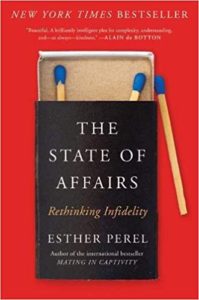Affairs in the Digital Age: Death by a Thousand Cuts*

Let’s face it: affairs have always been hurtful to the one who has been cheated on. Interestingly, relationship expert Esther Perel suggests that they are even more so now. Why? Because where once the cheated upon partner might have only had “lipstick on the collar”, an unexplained receipt in the pocket, or suspicious credit card charge as evidence of unfaithfulness, in the digital age, there are reams of text messages, emails, and photos that paint a painfully vivid picture of just how deep the betrayal/attraction/affection has gone – what Perel* refers to as “death by a thousand cuts”.
In her extensive research, Perel has uncovered some interesting conclusions, such as:
- It is not always one’s partner that a cheater is turning away from, but rather, the person they have become – they are not looking for another partner as much as they are looking for another Self
- Infidelity is about DESIRE (but not just the sexual-type) – affairs can make one feel important, there is appeal in the sense of taboo/secrecy, as well as the sense of ambiguity – we tend to long for things we cannot have
- Research has determined the most sexual organ is our brain. Our imagination and the buildup of an affair can be far more powerful than the sexual act
- Affairs can provide a sense of “feeling alive”. Perel asserts that death and mortality live in the shadow of an affair – an affair can feel like an antidote to death (“beating back the deadness”)
- Whereas divorce used to be the shameful result of infidelity, now choosing to stay in a marriage when you could leave is the new shame (research suggests that partners that have been the one cheated on, often feel unsupported and judged by their friends for choosing to stay and work through the issues that brought them to this place; divorce is so commonplace nowadays, it has lost the stigma)
- Historically, marriage was an economic enterprise and infidelity threatened financial security. Now that marriage is a romantic arrangement, infidelity threatens emotional security
- We tend to put more pressure on the roles of partnership for marriage in today’s world. We believe our partners can be everything to us – our best friend, our lover, the perfect parent, et cetera. We tend to idealize our partner and believe that we can fill all of another’s needs (one fanciful goal). Infidelity bursts that supercilious bubble. What ensues is a crisis of identity (who I am?), and a violation of trust (how can I ever trust my partner? Can I trust anyone??)
So, where does this leave couples contending with the traumatic aftermath of infidelity?
Bleak outcomes for couples are not necessarily the norm post-affair. Infidelity can in fact be a generative experience for the cheated upon. Couples willing to do the work have reported that the sense of loss they felt in their marriage has been rekindled/ignited, there is a new desire for the authenticity, and open and honest communication is part of a new way of being. Akin to the phenomena of post-traumatic growth (the ability to find meaning-making and personal growth from adversity), many couples have worked through the hurt of an affair to come out the other side with the gifts of self-discovery, wisdom, grace, as well as enhanced dual perspective and increased compassion.
If you are struggling in your marriage with the pain of infidelity, therapy can help.
christine@blacksheepcounselling.com
Reference:
Perel, E. (2018). Rethinking infidelity…a talk for anyone who have ever loved. TedTalk. Retrieved from https://www.youtube.com/watch?v=P2AUat93a8Q
